2021年中考英语一轮复习教材梳理 七年级(下册)Unit 1~Unit 6课件(53张PPT)
文档属性
| 名称 | 2021年中考英语一轮复习教材梳理 七年级(下册)Unit 1~Unit 6课件(53张PPT) | 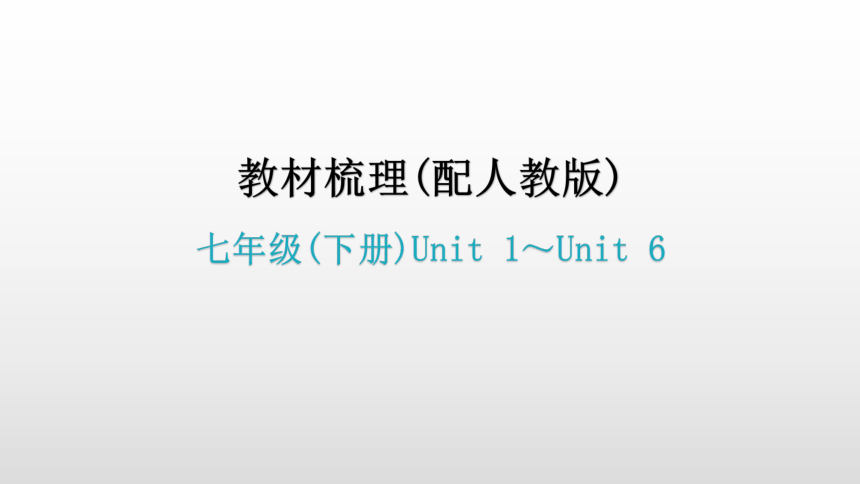 | |
| 格式 | pptx | ||
| 文件大小 | 204.7KB | ||
| 资源类型 | 教案 | ||
| 版本资源 | 人教新目标(Go for it)版 | ||
| 科目 | 英语 | ||
| 更新时间 | 2021-02-18 10:05:02 | ||
图片预览

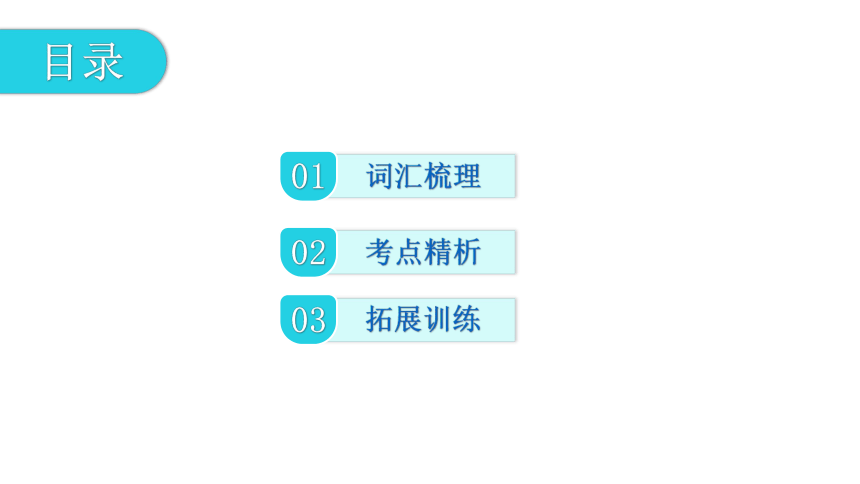
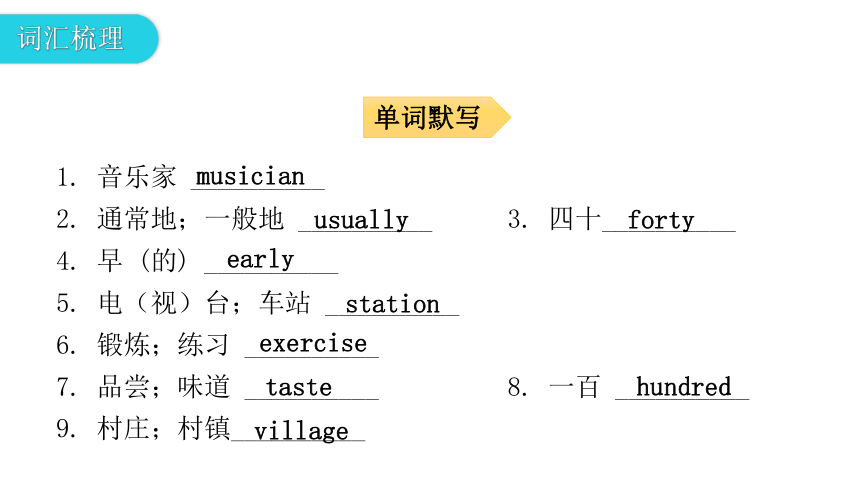
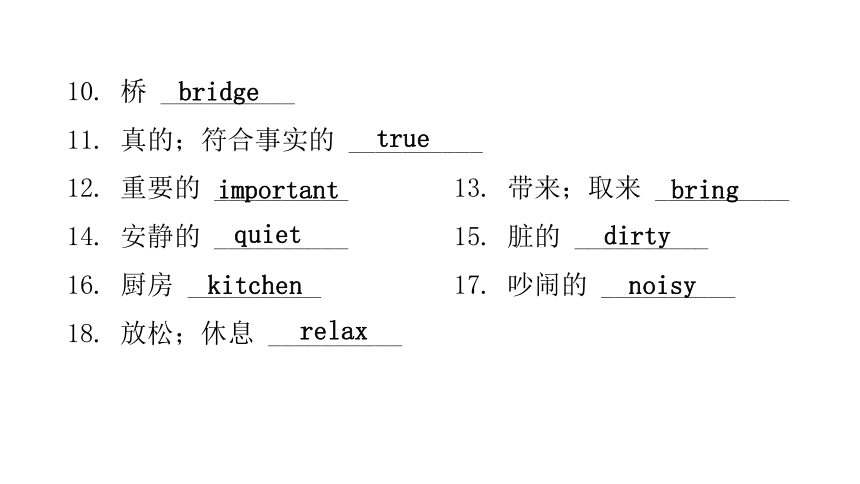
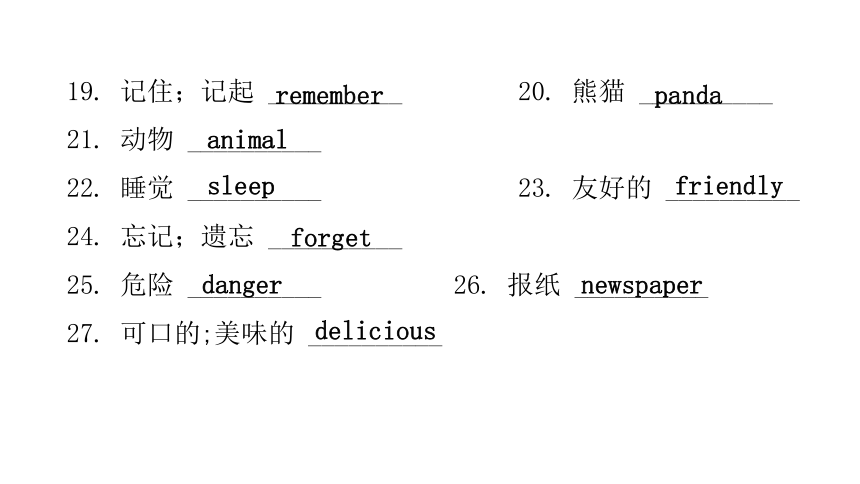
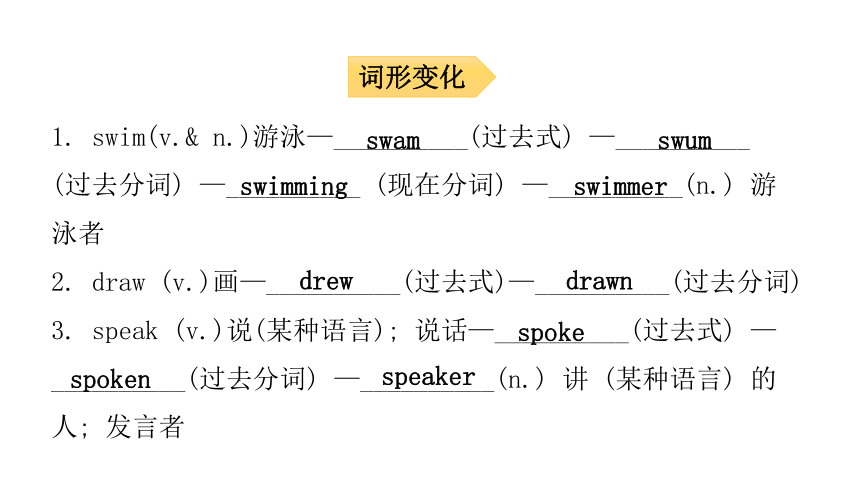
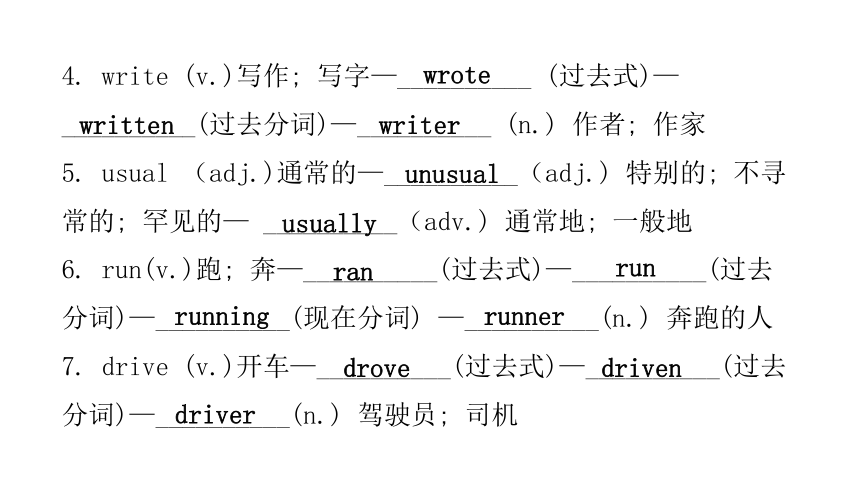
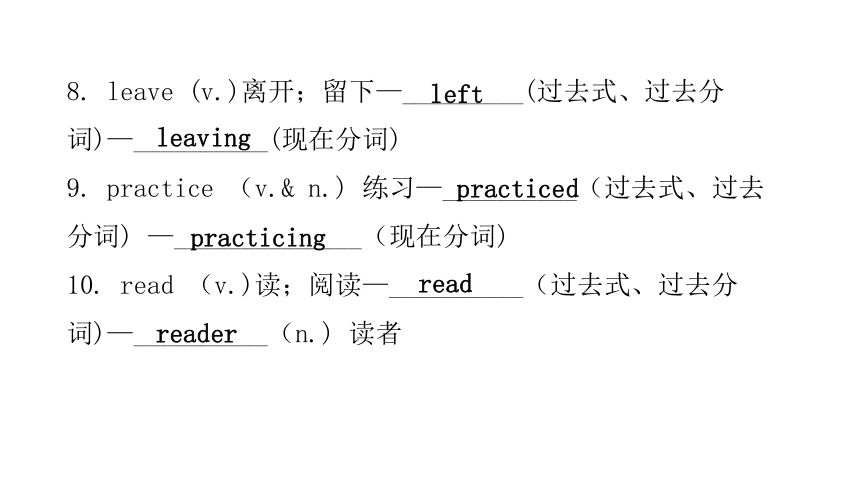
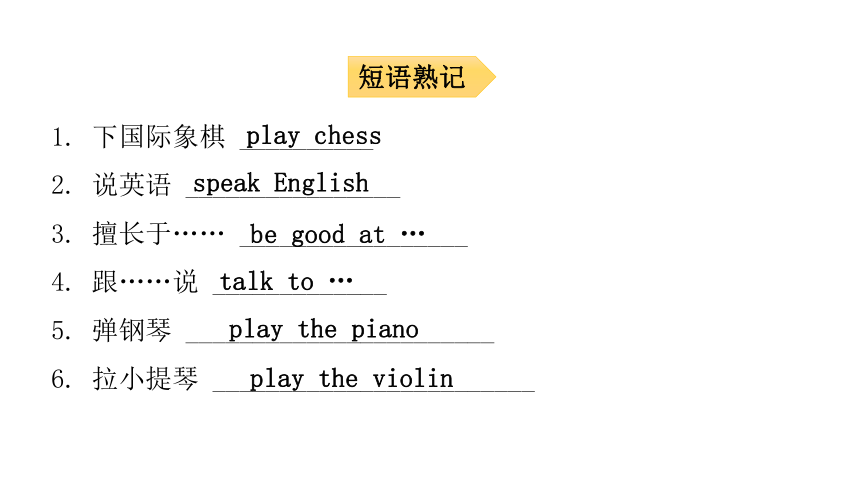
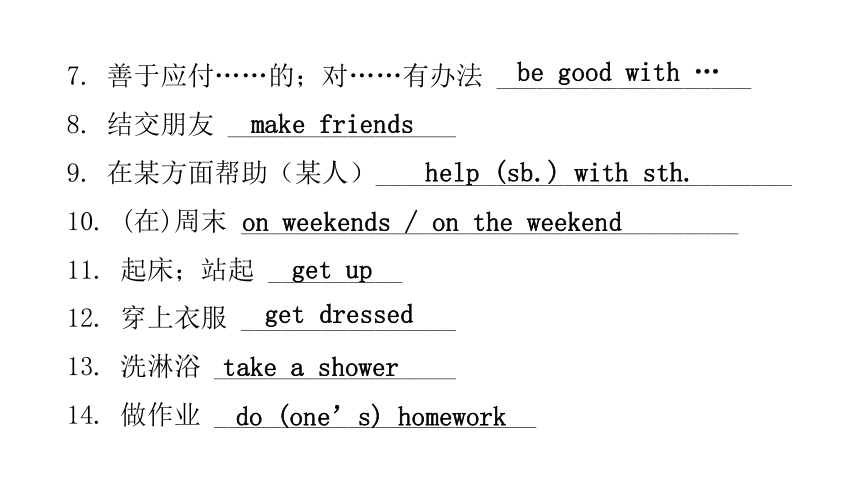
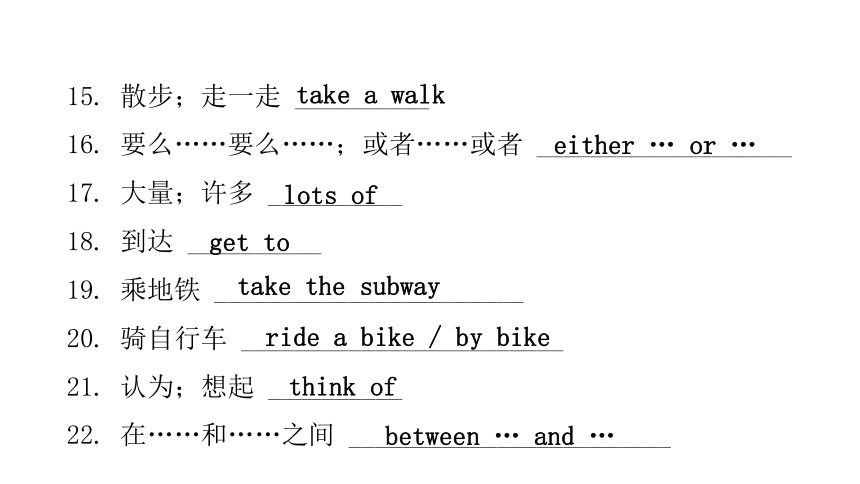
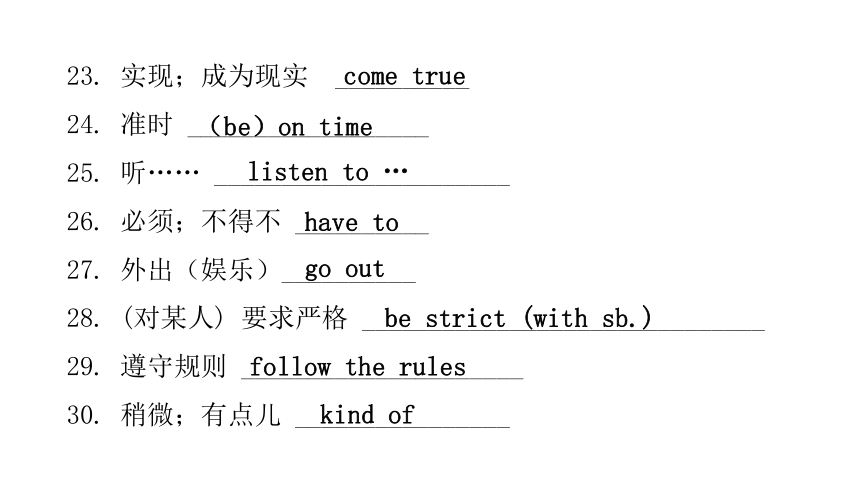
文档简介
教材梳理(配人教版)
七年级(下册)Unit 1~Unit 6
目录
01
词汇梳理
02
考点精析
03
拓展训练
词汇梳理
单词默写
1. 音乐家 __________
2. 通常地;一般地 __________ 3. 四十__________
4. 早 (的) __________
5. 电(视)台;车站 __________
6. 锻炼;练习 __________
7. 品尝;味道 __________ 8. 一百 __________
9. 村庄;村镇__________
musician
usually
forty
early
station
exercise
taste
hundred
village
10. 桥 __________
11. 真的;符合事实的 __________
12. 重要的 __________ 13. 带来;取来 __________
14. 安静的 __________ 15. 脏的 __________
16. 厨房 __________ 17. 吵闹的 __________
18. 放松;休息 __________
bridge
true
important
bring
quiet
dirty
kitchen
noisy
relax
19. 记住;记起 __________ 20. 熊猫 __________
21. 动物 __________
22. 睡觉 __________ 23. 友好的 __________
24. 忘记;遗忘 __________
25. 危险 __________ 26. 报纸 __________
27. 可口的;美味的 __________
remember
panda
animal
sleep
friendly
forget
danger
newspaper
delicious
1. swim(v.& n.)游泳—__________(过去式) —__________ (过去分词) —__________ (现在分词) —__________(n.) 游泳者
2. draw (v.)画—__________(过去式)—__________(过去分词)
3. speak (v.)说(某种语言); 说话—__________(过去式) —__________(过去分词) —__________(n.) 讲 (某种语言) 的人; 发言者
词形变化
swam
swum
swimming
swimmer
drew
drawn
spoke
spoken
speaker
4. write (v.)写作; 写字—__________ (过去式)—__________(过去分词)—__________ (n.) 作者; 作家
5. usual (adj.)通常的—__________(adj.) 特别的; 不寻常的; 罕见的— __________(adv.) 通常地; 一般地
6. run(v.)跑; 奔—__________(过去式)—__________(过去分词)—__________(现在分词) —__________(n.) 奔跑的人
7. drive (v.)开车—__________(过去式)—__________(过去分词)—__________(n.) 驾驶员; 司机
wrote
written
writer
unusual
usually
ran
run
running
runner
drove
driven
driver
8. leave (v.)离开;留下—_________(过去式、过去分词)—__________(现在分词)
9. practice (v.& n.) 练习—__________(过去式、过去分词) —______________(现在分词)
10. read (v.)读;阅读—__________(过去式、过去分词)—__________(n.) 读者
left
leaving
practiced
practicing
read
reader
1. 下国际象棋 __________
2. 说英语 ________________
3. 擅长于…… _________________
4. 跟……说 _____________
5. 弹钢琴 _______________________
6. 拉小提琴 ________________________
短语熟记
play chess
speak English
be good at …
talk to …
play the piano
play the violin
7. 善于应付……的;对……有办法 ___________________
8. 结交朋友 _________________
9. 在某方面帮助(某人)_______________________________
10. (在)周末 _____________________________________
11. 起床;站起 __________
12. 穿上衣服 ________________
13. 洗淋浴 __________________
14. 做作业 ________________________
be good with …
make friends
help (sb.) with sth.
on weekends / on the weekend
get up
get dressed
take a shower
do (one’s) homework
15. 散步;走一走 __________
16. 要么……要么……;或者……或者 ___________________
17. 大量;许多 __________
18. 到达 __________
19. 乘地铁 _______________________
20. 骑自行车 ________________________
21. 认为;想起 __________
22. 在……和……之间 ________________________
take a walk
either … or …
lots of
get to
take the subway
ride a bike / by bike
think of
between … and …
23. 实现;成为现实 __________
24. 准时 __________________
25. 听…… ______________________
26. 必须;不得不 __________
27. 外出(娱乐)__________
28. (对某人) 要求严格 ______________________________
29. 遵守规则 _____________________
30. 稍微;有点儿 ________________
come true
(be)on time
listen to …
have to
go out
be strict (with sb.)
follow the rules
kind of
31. 迷路 __________
32. 处于 (极大) 危险中 ___________________________
33. 砍倒 ____________________
34. 由……制成的 _____________________
35. 去电影院 _________________________
get lost
be in (great) danger
cut down
(be)made of
go to the movies
考点精析
【例句】Can you speak English?你会说英语吗?(Unit 1)
【解析】1. speak+语言。
2. talk to sb.对某人讲话;talk with sb. 与某人一起交谈; talk about sth.谈论某事。
考点1 speak, talk, tell, say的辨析
3. tell sb.(not) to do sth.告诉某人(不)要做某事;
tell stories / tell a story讲故事; tell a lie / tell lies说谎。
4. say接具体内容时,加双引号;接that从句时,从句转述用陈述句语气。
【演练】( )1. “Please go to bed early!” my mother ______.
A. says B. talks C. speaks D. tells
( )2. My grandmother ______ me a story last night.
A. said B. talked C. spoke D. told
A
D
( )3. Don’t ______ with classmates in the class.
A. say B. talk C. speak D. tell
( )4. I am going to ______ you something about my dad.
A. say B. talk C. speak D. tell
B
D
【例句】—What time do you usually get up?你通常几点起床?
—I usually get up at six thirty.我通常六点半起床。(Unit 2)
【解析】what time / when都可用于询问具体时间,回答用“at+具体时间”。时刻的读法如下:
1. 整点(只有一种表示方法):整点数+o’clock。如:8:00 eight o’clock (o’clock可省略)。
考点2 时间表达法
2. 非整点时,有顺读和逆读两种。
(1)顺读法:钟点数+分钟数。如:6:20 six twenty, 7:30 seven thirty, 5:55 five fifty-five。
(2)逆读法:分钟数+past / to+钟点数
①分钟数不超过30:分钟+past+钟点数, 意为“几点过几分”。如:1:15 fifteen past one(1点过15分),10:05 five past ten(10点过5分)。
②分钟数超过30:(60-分钟)+to+(下一个)钟点数, 意为“差几分到几点”。如:3:40 twenty to four(差20分到4点)。
【演练】1. twenty past two __________
2. half past eight __________
3. ten to nine __________
4. a quarter past five __________
5. a quarter to seven _____________
6. twenty to eleven _______________
7. twenty-five to eight ______________
8. half past twelve __________
2:20
8:30
8:50
5:15
6:45
10:40
7:35
12:30
【例句】—When does Scott go to work?斯科特几点去上班?
—He always goes to work at eleven o’clock. He’s never late.他总是十一点去上班。他从来不迟到。(Unit 2)
【解析】频率副词表示动作发生的频率,通常用于一般现在时态中。常见的频率副词有:never(从不),hardly(ever)(几乎不;很少),seldom(很少),sometimes(有时),often(经常),usually(通常),always(总是)。
考点3 频率副词
【演练】( )1. —How often do you drink milk,Jack?
—__________. I don’t like it at all.
A. Usually B. Sometimes
C. Never D. Often
2. ——你几点起床?——我通常九点半起床。 (汉译英)
—____________________________________________________
________________________
C
What time / When do you get up?—I usually get up at 9:30.
【例句】In the evening, I either watch TV or play computer games. 晚上我要么看电视要么玩电脑游戏。(Unit 2)
【解析】either … or … 意为“要么……要么……;或者……或者……;不是……就是……”,可连接两个独立的词、短语或句子。当这个结构连接两个并列的主语时,谓语动词要与or后面的主语在人称和数上保持一致,即“就近原则”。
考点4 either … or … 的用法
【拓展】1. either作副词时,意为“或者;也”,只用于否定句中。either还可作代词,意为“(两者中的)任何一个”,在句中可作主语和宾语。either在句中作主语时,谓语动词用单数形式。
2. not only … but also … 不但……而且……neither … nor … 既不……也不……
both … and … 两者都……
【演练】( )1. —______ Mary ______ Jack watched the wonderful match between Miami Heat and Houston Rockets.
—What a pity! They missed the exciting moment.
A. Both; and B. Not only; but also
C. Either; or D. Neither; nor
D
( )2. ______ you ______ your sister can get the work. We only need one worker.
A. Both; and B. Not only; but also
C. Either; or D. Neither; nor
( )3. ______ Tom ______ Peter is going to Beijing. Will you go and meet them at the airport?
A. Both; and B. Not only; but also
C. Either; or D. Neither; nor
C
B
【例句】—How do you get to school?你是怎样上学的?
—I ride my bike. 我骑自行车。(Unit 3)
【解析】交通方式的表达可以用以下几种方式:
1. by+交通工具(可数名词单数形式)。如:by bike 骑自行车。
2. go … in / on+限定词+交通工具名称。如:go to school on a bike骑自行车上学。
考点5 交通方式的表达
3. take / ride+限定词+交通工具名称。ride a bike 骑自行车。
4. walk to … / go … on foot。如:walk to school / go to school on foot 走路上学。
【演练】( )My aunt will get to Paris ______ plane ______ the morning of April 2nd.
A. by; on B. on; in C. by; in D. take; in
A
【例句】—How do you get to school?你是怎样到学校的?
—I ride my bike.我骑自行车。
—How long does it take to get to school? 到学校要用多少时间?
—It takes about 15 minutes.大约十五分钟。
考点6 由how引导的疑问句
—How far is it from your home to school? 从你家到学校有多远?
—It’s only about two kilometers.只有大约两公里。(Unit 3)
【解析】1. how意为“怎么样”,常用于对方式或程度进行提问。
2. 由how引导的常见特殊疑问词组:
(1)how old意为“多大”,用来询问年龄。
(2)how long意为“多久;多长时间”,也可以用来询问物体的长度,意为“多长”。
(3)how many意为“多少”,后面接可数名词复数形式,用来询问数量。
(4)how much意为“多少”,后面接不可数名词,用来询问数量,还可以用来询问价格。
(5)how far意为“离……有多远”,用来询问距离。
(6)how soon意为“多久;多快”,一般用“in+时间段”构成的时间状语回答。
(7)how often意为“多久一次”,用来询问频率。
【演练】( )1. —______ does Bart communicate with his family far away?
—By chatting on QQ or WeChat.
A. How B. Why C. Who D. When
( )2. —______ is it from the subway station to the airport?
—About 10 minutes by car.
A. How long B. How far C. How often D. How soon
A
B
3. Jane goes to school by bus. (就画线部分提问)
______________________________________________________
4. It took Kimmy half a week to write the new song. (就画线部分提问)
______________________________________________________
How does Jane go to school?
How long did it take Kimmy to write the new song?
【例句】How long does it take you to get to school? 你到学校要多长时间?(Unit 3)
【解析】1. 表示花时间的句型:sb.spend(s)+时间+on sth./ (in) doing sth.; It takes sb.+时间+to do sth. 如:
I spend two hours on / doing homework every day.=It takes me two hours to do homework every day.我每天花两个小时做作业。
考点7 表示花时间、花钱的句型
2. 表示花钱的句型:sb.spend(s) money on sth./ (in) doing sth.; sb.pay(s) money for sth.; sth.cost(s) sb. money.如:
He spent 100 yuan on / buying the coat.=He paid 100 yuan for the coat.=The coat cost him 100 yuan. 这件大衣花了他100元。
【演练】 ( )1. Many children ______ several hours playing computer games every week.
A. take B. spend C. pay D. cost
( )2. My father ______ 300 yuan for a beautiful watch last night.
A. took B. spent C. paid D. cost
( )3. The new house ______ my father millions of dollars.
A. took B. spent C. paid D. cost
B
C
D
拓展训练
一、语法选择
Sitting on the side of the highway and waiting to catch speeding drivers, a police officer saw a car driving along at 22 miles per hour. He thought to himself, “This driver is as __________ as a speeder (超速者).” So he turned __________ his lights and pulled the driver over. Getting close to the car, he noticed that __________ five old ladies, two in the
1
2
3
front seat and three in the back, with wide eyes and pale faces. The driver, __________ knew nothing about what happened, said to him, “Officer, I don’t understand. I was doing the speed limit. __________ was the problem?” “Madam,” the officer replied, “you weren’t speeding, but you __________ know that driving slower than the speed limit can also be a danger to other drivers. The same as a speeder.” “No, sir. I was doing the speed limit—only twenty-two miles
4
5
6
__________ hour.” The old woman said in a proud voice. The officer, hardly able __________ his chuckle (窃笑), said to her, “22 was the route (道路) number, not the speed limit.” A bit embarrassed (尴尬的), the woman smiled widely and thanked him for pointing out her mistake. “But __________ I let you go, madam, I have to ask … Is everyone in this car OK? These women seemed to be shaking badly and they didn’t make any sound.” “Oh, they’ll be all right in a minute. We just __________ off Route 119.”
7
8
9
10
( )1. A. danger B. dangerous
C. more dangerous D. the most dangerous
( )2. A. off B. down
C. on D. up
( )3. A. there has B. there have
C. there was D. there were
( )4. A. who B. whose
C. which D. whom
( )5. A. Where B. Which
C. How D. What
B
C
D
A
D
( )6. A. can B. will
C. might D. should
( )7. A. a B. an
C. the D. /
( )8. A. control B. controlling
C. to control D. controls
( )9. A. until B. before
C. although D. if
( )10. A. get B. are getting
C. will get D. got
D
B
C
B
D
二、完形填空
My work keeps me in Hong Kong most of the year. But I do try to __________ for a month in the summer—usually July. Now as you may know, that’s the main holiday season in Europe, and the favorite place for a __________ and the famous cities are usually very crowed. But I’m not seeking the sun—I get plenty of __________ in Hong Kong—and I’m certainly not seeking the people! So when I go on holiday, I buy a Train Pass(a kind of train ticket) that offers me the
11
12
13
first class (头等座位) to travel on most the railways of Western Europe, because first-class compartments(隔间) are __________ crowded. There are usually __________ cars in the train. We can buy some snacks and drinks.
I find the train travel relaxing and __________. There is always something to see. You can get a very good __________ of what a country is like from a train. You don’t go too __________, and you stop very often.
14
15
16
17
18
Also, rail travel is very safe, and I am never as __________ on a train as I am on a ship!
The reason that I seldom travel by plane is quite simple. Because as train stations are usually built in the city center, I needn’t __________ transport, which can be a problem when arriving by air.
19
20
( )11. A. get up B. get down
C. get off D. get away
( )12. A. holiday B. play
C. sport D. summer
( )13. A. money B. sunshine
C. rest D. happiness
( )14. A. even B. rather
C. too D. hardly
( )15. A. running B. parking
C. dining D. driving
D
A
B
D
C
( )16. A. interesting B. boring
C. uncomfortable D. lonely
( )17. A. suggestion B. idea
C. plan D. sight
( )18. A. surely B. fast
C. far D. slowly
( )19. A. dark B. clean
C. sick D. healthy
( )20. A. know about B. hear about
C. talk about D. worry about
A
D
B
C
D
三、短文填空
请用适当的词完成下面的短文,并把所缺单词填写在横线上。每个空只能填写一个形式正确、意义相符的单词。
An old saying goes, “When in Rome, do as the Romans do.” I learned the __________ of this when I studied in Russia. One day I __________ some of my Chinese friends to a famous local restaurant in Moscow. My guests and I were __________ about visiting Red
21
22
23
Square and happy about our meeting. We had a warm chat until the waiter told me that we were being too loud. We turned our voices lower. But it didn’t last long. The __________ came over to us two more times with the same message. How bad an impression (印象) we must have left on the local people! In China, it’s natural and important __________ a host to make a lively atmosphere (气氛). However, in Russia and Western countries,
24
25
having a meal in a public place means you must keep __________ voice low. You need to be polite to others. I feel bad about this. Even though we try our best, it’s very difficult to __________ a new habit. Russians have their own special habits. My Russian friend, Andrey, always looks around and thinks for a while before __________ home. I asked him why he did
26
27
28
this. “Aha,” Andrey said, “in Russia, people always take about a minute to go over things and plans in their minds before going out. __________ they won’t leave anything necessary behind.” Finding the differences __________ two kinds of cultures is much fun. I’d like to keep my eyes and mind open.
29
30
21. __________22. __________23. __________
24. __________25. __________
26. __________27. __________28. __________
29. __________30. __________
meaning
invited
excited
waiter
for
your
develop
leaving
So
between
谢 谢
七年级(下册)Unit 1~Unit 6
目录
01
词汇梳理
02
考点精析
03
拓展训练
词汇梳理
单词默写
1. 音乐家 __________
2. 通常地;一般地 __________ 3. 四十__________
4. 早 (的) __________
5. 电(视)台;车站 __________
6. 锻炼;练习 __________
7. 品尝;味道 __________ 8. 一百 __________
9. 村庄;村镇__________
musician
usually
forty
early
station
exercise
taste
hundred
village
10. 桥 __________
11. 真的;符合事实的 __________
12. 重要的 __________ 13. 带来;取来 __________
14. 安静的 __________ 15. 脏的 __________
16. 厨房 __________ 17. 吵闹的 __________
18. 放松;休息 __________
bridge
true
important
bring
quiet
dirty
kitchen
noisy
relax
19. 记住;记起 __________ 20. 熊猫 __________
21. 动物 __________
22. 睡觉 __________ 23. 友好的 __________
24. 忘记;遗忘 __________
25. 危险 __________ 26. 报纸 __________
27. 可口的;美味的 __________
remember
panda
animal
sleep
friendly
forget
danger
newspaper
delicious
1. swim(v.& n.)游泳—__________(过去式) —__________ (过去分词) —__________ (现在分词) —__________(n.) 游泳者
2. draw (v.)画—__________(过去式)—__________(过去分词)
3. speak (v.)说(某种语言); 说话—__________(过去式) —__________(过去分词) —__________(n.) 讲 (某种语言) 的人; 发言者
词形变化
swam
swum
swimming
swimmer
drew
drawn
spoke
spoken
speaker
4. write (v.)写作; 写字—__________ (过去式)—__________(过去分词)—__________ (n.) 作者; 作家
5. usual (adj.)通常的—__________(adj.) 特别的; 不寻常的; 罕见的— __________(adv.) 通常地; 一般地
6. run(v.)跑; 奔—__________(过去式)—__________(过去分词)—__________(现在分词) —__________(n.) 奔跑的人
7. drive (v.)开车—__________(过去式)—__________(过去分词)—__________(n.) 驾驶员; 司机
wrote
written
writer
unusual
usually
ran
run
running
runner
drove
driven
driver
8. leave (v.)离开;留下—_________(过去式、过去分词)—__________(现在分词)
9. practice (v.& n.) 练习—__________(过去式、过去分词) —______________(现在分词)
10. read (v.)读;阅读—__________(过去式、过去分词)—__________(n.) 读者
left
leaving
practiced
practicing
read
reader
1. 下国际象棋 __________
2. 说英语 ________________
3. 擅长于…… _________________
4. 跟……说 _____________
5. 弹钢琴 _______________________
6. 拉小提琴 ________________________
短语熟记
play chess
speak English
be good at …
talk to …
play the piano
play the violin
7. 善于应付……的;对……有办法 ___________________
8. 结交朋友 _________________
9. 在某方面帮助(某人)_______________________________
10. (在)周末 _____________________________________
11. 起床;站起 __________
12. 穿上衣服 ________________
13. 洗淋浴 __________________
14. 做作业 ________________________
be good with …
make friends
help (sb.) with sth.
on weekends / on the weekend
get up
get dressed
take a shower
do (one’s) homework
15. 散步;走一走 __________
16. 要么……要么……;或者……或者 ___________________
17. 大量;许多 __________
18. 到达 __________
19. 乘地铁 _______________________
20. 骑自行车 ________________________
21. 认为;想起 __________
22. 在……和……之间 ________________________
take a walk
either … or …
lots of
get to
take the subway
ride a bike / by bike
think of
between … and …
23. 实现;成为现实 __________
24. 准时 __________________
25. 听…… ______________________
26. 必须;不得不 __________
27. 外出(娱乐)__________
28. (对某人) 要求严格 ______________________________
29. 遵守规则 _____________________
30. 稍微;有点儿 ________________
come true
(be)on time
listen to …
have to
go out
be strict (with sb.)
follow the rules
kind of
31. 迷路 __________
32. 处于 (极大) 危险中 ___________________________
33. 砍倒 ____________________
34. 由……制成的 _____________________
35. 去电影院 _________________________
get lost
be in (great) danger
cut down
(be)made of
go to the movies
考点精析
【例句】Can you speak English?你会说英语吗?(Unit 1)
【解析】1. speak+语言。
2. talk to sb.对某人讲话;talk with sb. 与某人一起交谈; talk about sth.谈论某事。
考点1 speak, talk, tell, say的辨析
3. tell sb.(not) to do sth.告诉某人(不)要做某事;
tell stories / tell a story讲故事; tell a lie / tell lies说谎。
4. say接具体内容时,加双引号;接that从句时,从句转述用陈述句语气。
【演练】( )1. “Please go to bed early!” my mother ______.
A. says B. talks C. speaks D. tells
( )2. My grandmother ______ me a story last night.
A. said B. talked C. spoke D. told
A
D
( )3. Don’t ______ with classmates in the class.
A. say B. talk C. speak D. tell
( )4. I am going to ______ you something about my dad.
A. say B. talk C. speak D. tell
B
D
【例句】—What time do you usually get up?你通常几点起床?
—I usually get up at six thirty.我通常六点半起床。(Unit 2)
【解析】what time / when都可用于询问具体时间,回答用“at+具体时间”。时刻的读法如下:
1. 整点(只有一种表示方法):整点数+o’clock。如:8:00 eight o’clock (o’clock可省略)。
考点2 时间表达法
2. 非整点时,有顺读和逆读两种。
(1)顺读法:钟点数+分钟数。如:6:20 six twenty, 7:30 seven thirty, 5:55 five fifty-five。
(2)逆读法:分钟数+past / to+钟点数
①分钟数不超过30:分钟+past+钟点数, 意为“几点过几分”。如:1:15 fifteen past one(1点过15分),10:05 five past ten(10点过5分)。
②分钟数超过30:(60-分钟)+to+(下一个)钟点数, 意为“差几分到几点”。如:3:40 twenty to four(差20分到4点)。
【演练】1. twenty past two __________
2. half past eight __________
3. ten to nine __________
4. a quarter past five __________
5. a quarter to seven _____________
6. twenty to eleven _______________
7. twenty-five to eight ______________
8. half past twelve __________
2:20
8:30
8:50
5:15
6:45
10:40
7:35
12:30
【例句】—When does Scott go to work?斯科特几点去上班?
—He always goes to work at eleven o’clock. He’s never late.他总是十一点去上班。他从来不迟到。(Unit 2)
【解析】频率副词表示动作发生的频率,通常用于一般现在时态中。常见的频率副词有:never(从不),hardly(ever)(几乎不;很少),seldom(很少),sometimes(有时),often(经常),usually(通常),always(总是)。
考点3 频率副词
【演练】( )1. —How often do you drink milk,Jack?
—__________. I don’t like it at all.
A. Usually B. Sometimes
C. Never D. Often
2. ——你几点起床?——我通常九点半起床。 (汉译英)
—____________________________________________________
________________________
C
What time / When do you get up?—I usually get up at 9:30.
【例句】In the evening, I either watch TV or play computer games. 晚上我要么看电视要么玩电脑游戏。(Unit 2)
【解析】either … or … 意为“要么……要么……;或者……或者……;不是……就是……”,可连接两个独立的词、短语或句子。当这个结构连接两个并列的主语时,谓语动词要与or后面的主语在人称和数上保持一致,即“就近原则”。
考点4 either … or … 的用法
【拓展】1. either作副词时,意为“或者;也”,只用于否定句中。either还可作代词,意为“(两者中的)任何一个”,在句中可作主语和宾语。either在句中作主语时,谓语动词用单数形式。
2. not only … but also … 不但……而且……neither … nor … 既不……也不……
both … and … 两者都……
【演练】( )1. —______ Mary ______ Jack watched the wonderful match between Miami Heat and Houston Rockets.
—What a pity! They missed the exciting moment.
A. Both; and B. Not only; but also
C. Either; or D. Neither; nor
D
( )2. ______ you ______ your sister can get the work. We only need one worker.
A. Both; and B. Not only; but also
C. Either; or D. Neither; nor
( )3. ______ Tom ______ Peter is going to Beijing. Will you go and meet them at the airport?
A. Both; and B. Not only; but also
C. Either; or D. Neither; nor
C
B
【例句】—How do you get to school?你是怎样上学的?
—I ride my bike. 我骑自行车。(Unit 3)
【解析】交通方式的表达可以用以下几种方式:
1. by+交通工具(可数名词单数形式)。如:by bike 骑自行车。
2. go … in / on+限定词+交通工具名称。如:go to school on a bike骑自行车上学。
考点5 交通方式的表达
3. take / ride+限定词+交通工具名称。ride a bike 骑自行车。
4. walk to … / go … on foot。如:walk to school / go to school on foot 走路上学。
【演练】( )My aunt will get to Paris ______ plane ______ the morning of April 2nd.
A. by; on B. on; in C. by; in D. take; in
A
【例句】—How do you get to school?你是怎样到学校的?
—I ride my bike.我骑自行车。
—How long does it take to get to school? 到学校要用多少时间?
—It takes about 15 minutes.大约十五分钟。
考点6 由how引导的疑问句
—How far is it from your home to school? 从你家到学校有多远?
—It’s only about two kilometers.只有大约两公里。(Unit 3)
【解析】1. how意为“怎么样”,常用于对方式或程度进行提问。
2. 由how引导的常见特殊疑问词组:
(1)how old意为“多大”,用来询问年龄。
(2)how long意为“多久;多长时间”,也可以用来询问物体的长度,意为“多长”。
(3)how many意为“多少”,后面接可数名词复数形式,用来询问数量。
(4)how much意为“多少”,后面接不可数名词,用来询问数量,还可以用来询问价格。
(5)how far意为“离……有多远”,用来询问距离。
(6)how soon意为“多久;多快”,一般用“in+时间段”构成的时间状语回答。
(7)how often意为“多久一次”,用来询问频率。
【演练】( )1. —______ does Bart communicate with his family far away?
—By chatting on QQ or WeChat.
A. How B. Why C. Who D. When
( )2. —______ is it from the subway station to the airport?
—About 10 minutes by car.
A. How long B. How far C. How often D. How soon
A
B
3. Jane goes to school by bus. (就画线部分提问)
______________________________________________________
4. It took Kimmy half a week to write the new song. (就画线部分提问)
______________________________________________________
How does Jane go to school?
How long did it take Kimmy to write the new song?
【例句】How long does it take you to get to school? 你到学校要多长时间?(Unit 3)
【解析】1. 表示花时间的句型:sb.spend(s)+时间+on sth./ (in) doing sth.; It takes sb.+时间+to do sth. 如:
I spend two hours on / doing homework every day.=It takes me two hours to do homework every day.我每天花两个小时做作业。
考点7 表示花时间、花钱的句型
2. 表示花钱的句型:sb.spend(s) money on sth./ (in) doing sth.; sb.pay(s) money for sth.; sth.cost(s) sb. money.如:
He spent 100 yuan on / buying the coat.=He paid 100 yuan for the coat.=The coat cost him 100 yuan. 这件大衣花了他100元。
【演练】 ( )1. Many children ______ several hours playing computer games every week.
A. take B. spend C. pay D. cost
( )2. My father ______ 300 yuan for a beautiful watch last night.
A. took B. spent C. paid D. cost
( )3. The new house ______ my father millions of dollars.
A. took B. spent C. paid D. cost
B
C
D
拓展训练
一、语法选择
Sitting on the side of the highway and waiting to catch speeding drivers, a police officer saw a car driving along at 22 miles per hour. He thought to himself, “This driver is as __________ as a speeder (超速者).” So he turned __________ his lights and pulled the driver over. Getting close to the car, he noticed that __________ five old ladies, two in the
1
2
3
front seat and three in the back, with wide eyes and pale faces. The driver, __________ knew nothing about what happened, said to him, “Officer, I don’t understand. I was doing the speed limit. __________ was the problem?” “Madam,” the officer replied, “you weren’t speeding, but you __________ know that driving slower than the speed limit can also be a danger to other drivers. The same as a speeder.” “No, sir. I was doing the speed limit—only twenty-two miles
4
5
6
__________ hour.” The old woman said in a proud voice. The officer, hardly able __________ his chuckle (窃笑), said to her, “22 was the route (道路) number, not the speed limit.” A bit embarrassed (尴尬的), the woman smiled widely and thanked him for pointing out her mistake. “But __________ I let you go, madam, I have to ask … Is everyone in this car OK? These women seemed to be shaking badly and they didn’t make any sound.” “Oh, they’ll be all right in a minute. We just __________ off Route 119.”
7
8
9
10
( )1. A. danger B. dangerous
C. more dangerous D. the most dangerous
( )2. A. off B. down
C. on D. up
( )3. A. there has B. there have
C. there was D. there were
( )4. A. who B. whose
C. which D. whom
( )5. A. Where B. Which
C. How D. What
B
C
D
A
D
( )6. A. can B. will
C. might D. should
( )7. A. a B. an
C. the D. /
( )8. A. control B. controlling
C. to control D. controls
( )9. A. until B. before
C. although D. if
( )10. A. get B. are getting
C. will get D. got
D
B
C
B
D
二、完形填空
My work keeps me in Hong Kong most of the year. But I do try to __________ for a month in the summer—usually July. Now as you may know, that’s the main holiday season in Europe, and the favorite place for a __________ and the famous cities are usually very crowed. But I’m not seeking the sun—I get plenty of __________ in Hong Kong—and I’m certainly not seeking the people! So when I go on holiday, I buy a Train Pass(a kind of train ticket) that offers me the
11
12
13
first class (头等座位) to travel on most the railways of Western Europe, because first-class compartments(隔间) are __________ crowded. There are usually __________ cars in the train. We can buy some snacks and drinks.
I find the train travel relaxing and __________. There is always something to see. You can get a very good __________ of what a country is like from a train. You don’t go too __________, and you stop very often.
14
15
16
17
18
Also, rail travel is very safe, and I am never as __________ on a train as I am on a ship!
The reason that I seldom travel by plane is quite simple. Because as train stations are usually built in the city center, I needn’t __________ transport, which can be a problem when arriving by air.
19
20
( )11. A. get up B. get down
C. get off D. get away
( )12. A. holiday B. play
C. sport D. summer
( )13. A. money B. sunshine
C. rest D. happiness
( )14. A. even B. rather
C. too D. hardly
( )15. A. running B. parking
C. dining D. driving
D
A
B
D
C
( )16. A. interesting B. boring
C. uncomfortable D. lonely
( )17. A. suggestion B. idea
C. plan D. sight
( )18. A. surely B. fast
C. far D. slowly
( )19. A. dark B. clean
C. sick D. healthy
( )20. A. know about B. hear about
C. talk about D. worry about
A
D
B
C
D
三、短文填空
请用适当的词完成下面的短文,并把所缺单词填写在横线上。每个空只能填写一个形式正确、意义相符的单词。
An old saying goes, “When in Rome, do as the Romans do.” I learned the __________ of this when I studied in Russia. One day I __________ some of my Chinese friends to a famous local restaurant in Moscow. My guests and I were __________ about visiting Red
21
22
23
Square and happy about our meeting. We had a warm chat until the waiter told me that we were being too loud. We turned our voices lower. But it didn’t last long. The __________ came over to us two more times with the same message. How bad an impression (印象) we must have left on the local people! In China, it’s natural and important __________ a host to make a lively atmosphere (气氛). However, in Russia and Western countries,
24
25
having a meal in a public place means you must keep __________ voice low. You need to be polite to others. I feel bad about this. Even though we try our best, it’s very difficult to __________ a new habit. Russians have their own special habits. My Russian friend, Andrey, always looks around and thinks for a while before __________ home. I asked him why he did
26
27
28
this. “Aha,” Andrey said, “in Russia, people always take about a minute to go over things and plans in their minds before going out. __________ they won’t leave anything necessary behind.” Finding the differences __________ two kinds of cultures is much fun. I’d like to keep my eyes and mind open.
29
30
21. __________22. __________23. __________
24. __________25. __________
26. __________27. __________28. __________
29. __________30. __________
meaning
invited
excited
waiter
for
your
develop
leaving
So
between
谢 谢
